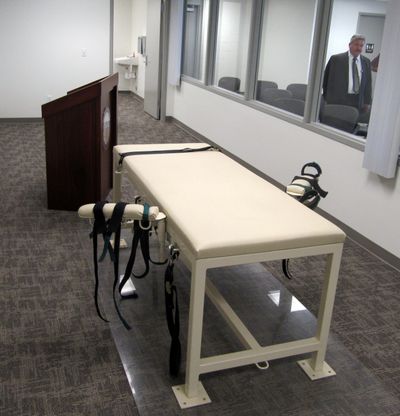Otter standing by decision not to spare killer’s life

BOISE – Idaho Gov. Butch Otter, a Catholic who once studied for the priesthood, is the only one who can spare the life of condemned Idaho inmate Paul Ezra Rhoades, a multiple murderer scheduled for execution next Friday.
Otter, a supporter of the death penalty, has stuck by his position, even in the face of pleas for mercy from the pope, the Swiss ambassador and from the bishop of the Roman Catholic Diocese of Idaho.
“It’s tough, it’s tough,” said Otter, a conservative Republican, when asked about balancing his faith and the death penalty. He’s been reluctant to discuss the matter as Idaho approaches its first execution since 1994, when condemned murderer Keith Eugene Wells dropped his appeals and requested to be put to death. Unlike Wells, Rhoades has tried every appeal, exhausted every remedy, and still is fighting in federal court to challenge Idaho’s lethal-injection execution method as unconstitutionally cruel; a federal judge will decide Monday if that challenge should delay the execution.
Once before, an Idaho governor has commuted a death sentence. In 1996, then-Gov. Phil Batt agreed with Idaho’s pardons and parole commission and commuted the sentence of Donald Paradis from death to life without parole, amid questions about his original conviction; Paradis was released in 2001, after pleading guilty to being an accessory to murder.
There are no such questions in Rhoades’ case, however. His supporters simply plead for mercy.
“Paul is not the same man he was in 1987,” Rhoades’ mother, Pauline Rhoades, said in a statement. “Over the past 24 years, he has returned to being the same caring and unselfish person he was before we lost him to drugs. … He has taken responsibility for his actions, and he is doing everything in his power to make up for what he did.”
Otter told The Spokesman-Review this week, “I support the death penalty,” adding that it’s an issue he’s given a lot of thought to “all my life.”
“I think that as our criminal justice system … suggests, people have to be held responsible, and sometimes it’s to the max, and this is one of those cases,” Otter said. “They have to be held accountable for their actions.”
Rhoades’ crimes terrorized eastern Idaho in 1987, when three people, – two women and one man – were murdered in the space of three weeks. The string of kidnappings, rapes and murders shocked the conservative community; Rhoades received the death penalty for the murders of Stacy Baldwin and Susan Michelbacher, plus two life sentences for the murder of Nolan Haddon.
Mia Crosthwaite, a Catholic activist in Boise and who serves as spokeswoman for Idahoans Against the Death Penalty, said, “It’s just morally wrong. It’s unnecessary. My children will be no safer next Saturday after the execution is done than they are today, because the state of Idaho is perfectly capable of holding Paul Ezra Rhoades in prison for the rest of his life and protecting society.”
But some Idahoans who’ve flooded the governor’s office with letters and emails in recent weeks disagree.
“Did he show mercy to his victims?” asked Sharann Nafus, of Blackfoot. “You are in our prayers,” wrote a couple from Idaho Falls, urging the governor to uphold the sentence.
Most of his messages in recent weeks, however, oppose it, including one from Monsignor Jean-Francois Lantheaume, the personal representative of Pope Benedict XVI in the United States, who issued “a call for mercy beyond the strict confines of justice.”
The Rev. Michael Driscoll, bishop of the Roman Catholic Diocese of Boise, wrote to Otter, “Other ways are available to punish criminals and to protect society that are more respectful of human life.”
Rhoades’ appeal to the U.S. Supreme Court was rejected Oct. 11, and Idaho’s state board of pardons and parole last week rejected his bid for a clemency hearing. Preparations for the execution are under way at the Idaho Maximum Security Institution south of Boise.
Crosthwaite said she and other Idaho death penalty opponents met with Idaho Department of Corrections officials Thursday and were briefed on where they can protest, in a prescribed area at the state prison compound’s main gate south of Boise; a separate area will be set aside for protesters supporting the execution.
“They said ‘dress very warmly,’ which we already knew, but that was very kind of them to point that out,” Crosthwaite said. “They said it’s going to be cold. We intend to be prayerful and peaceful and just be present.”
The execution is set for 7 a.m. Pacific time Friday.